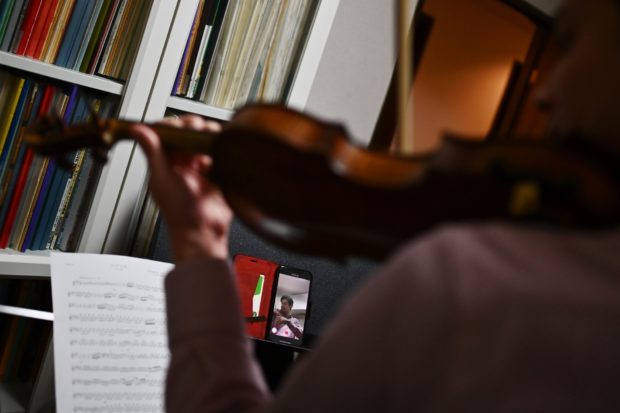WATCH: Japan telework orchestra strikes a chord in coronavirus gloom

Second violinist Sohei Birmann, 35, of the New Japan Philharmonic Orchestra plays music while recording himself at home in Tokyo. Image: AFP/Charly Triballeau
The members of the New Japan Philharmonic Orchestra tune up for their latest recital, more than 60 musicians ranging from trombonists to violinists and percussionists—but this is no ordinary performance.
In a musical twist on the telework trend forced on the world by the coronavirus pandemic, they appear in tiny blocks on screen, recording their parts separately before technology brings them together in joyous harmony.
The on-screen mosaic shows some musicians performing in their tiny apartments, others playing their instruments outside under a bright blue sky.
In scenes familiar to millions working from home globally, one veteran violinist has two toddlers—apparently his grandchildren—larking about in the corner.
And a trombone player has a pet bird perched next to him as the orchestra belts out not Beethoven or Mozart but “Paprika”—probably Japan’s most popular children’s song.
Tuba player Kazuhiko Sato said he was incredulous when the idea of the teleworking orchestra was first floated.
“I didn’t think this would work. I felt as if I was being tricked into something,” said Sato, 44.
But with all orchestra members stuck at home and concerts canceled or postponed, this was the only way to make their music heard.
Sato confined himself in a soundproof room and filmed on a smartphone his tuba part—mostly a rhythmical low-pitched “da-da-da.”
Second violinist Sohei Birmann, 35, was more bullish about the teleworking trial initially.
“We have played together for years and years to create music, so I thought we could do it with no problem,” Birmann told Agence France-Presse with a smile.
“The result of it was totally out of rhythm.”
“Usually when we play in the orchestra, we harmonize ourselves using the breath or eye movements of other members,” he said.
They had to do several takes of their respective videos, he said, fine-tuning the rhythm and pitch.
‘Most unbearable thing’
The mastermind of the teleworking orchestra is trombonist Hisato Yamaguchi, 45.
“An orchestra like ours creates music together within a group of 80 musicians. Having to stay alone and not be able to come together to play is the most unbearable thing,” he said.
With coronavirus cases spiking in Tokyo in recent days, Gov. Yuriko Koike has pleaded with residents to work from home and avoid all unnecessary trips.
The pandemic has had a huge impact on the entertainment industry with venues from downtown jazz bars to large concert halls shuttered.
It has caused Sato to appreciate what the orchestra once had.
“I never thought twice about playing for an audience at a concert hall and hearing fellow members playing,” he said.
“I now know what a wonderful moment it was.”
‘We don’t need words’
Birmann said they have learned an important lesson from the teleworking.
“I think it’s been a good opportunity to think about how we can reach out to an audience, rather than simply waiting for them to come to our concerts,” he said.
As the killer virus upends lives and economies around the world, other prestigious orchestras have also gone virtual.
For example, the French National Orchestra has played Ravel’s “Bolero” from home in a similar fashion.
The Rotterdam Philharmonic Orchestra tried the same trick with Beethoven’s “Ode to Joy” and the Toronto Symphony Orchestra played Aaron Copland’s “Appalachian Spring”.
As the coronavirus spreads in Japan, there are growing fears that Prime Minister Shinzo Abe will soon declare a state of emergency, paving the way for greater restrictions on movement.
Trombonist Yamaguchi said although he often feels music is helpless during a crisis like this, he will stick to doing what he loves.
“Last time I felt this way was the (2011 tsunami) disaster… people say ‘this is no time for music,'” he said.
“We can communicate with anybody in the world through music. We don’t need words. Music gives us great encouragement.
“There will be a time soon when people will need us again.” CL /ra
RELATED STORIES:
Four music videos to boost your creativity at home
For more news about the novel coronavirus click here.
What you need to know about Coronavirus.
For more information on COVID-19, call the DOH Hotline: (02) 86517800 local 1149/1150.
The Inquirer Foundation supports our healthcare frontliners and is still accepting cash donations to be deposited at Banco de Oro (BDO) current account #007960018860 or donate through PayMaya using this link.